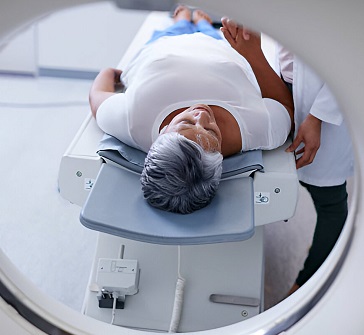 Book Appt.
Book Appt.
 Call Now
Call Now


Introduction
Radiofrequency ablation (RFA), also called radiofrequency neurotomy, uses radio waves to create a current that heats a small area of nerve tissue. The heat destroys that nerve area, stopping it from sending pain signals to your brain. RFA can provide lasting relief for people with chronic pain, especially in the lower back, neck, and arthritic joints. Radiofrequency ablation aims to stop or reduce pain, improve function, reduce the number of pain medications taken, and avoid or delay surgery.
RFA is used to treat conditions such as chronic pain caused by conditions such as pain in your neck, back, and knee, cancer pain, facial pain caused by trigeminal neuralgia, peripheral nerve pain, heart rhythm problems, and tumors. In this blog, we will study radiofrequency ablation (RFA) and its procedure.
Occurrence
A little hollow needle is introduced into the pain-causing nerve during a radiofrequency ablation procedure. An electrode is put into the top of the needle, which transmits radio waves to the targeted nerve. The heat causes a lesion in the nerve, preventing it from sending pain signals to the brain. The treatment does not cause any damage to nearby healthy nerves.
Candidate for radiofrequency ablation
Radiofrequency ablation (RFA) may be appropriate for you if you have:
Pain alleviation after a nerve block injection. This informs your provider that the specific nerve is the source of your discomfort and is a suitable target for RFA.
Chronic pain that does not respond to other treatments such as pain relievers and physical therapy.
Procedure Details
Before procedure
Your healthcare professional will go over your medical and pharmaceutical history and ask you about your pain. If you take aspirin or other blood thinners, you may need to discontinue them for a few days before the surgery. Your provider will evaluate you and request X-rays or other imaging tests to inspect your anatomy, assess the severity of arthritis or other spine injuries, and rule out any other causes.
Your provider will do a diagnostic block test to identify the source and severity of your pain, allowing them to forecast the potential amount of pain reduction. The block comprises injecting a local anaesthetic near the source of discomfort. If the diagnostic block does not provide adequate relief, you may not benefit from RFA. If you respond well to the diagnostic block, your doctor may recommend RFA to relieve your pain.
Procedure
First, you will lie on your stomach on a specialized X-ray table. Throughout the treatment, your healthcare provider will use monitors to keep track of your condition. You'll stay awake so you can respond to your provider's inquiries during the operation. Medications can be used during the surgery to help you relax, although this is optional. Your doctor will apply a local anesthetic to the area of your skin where the needle will be put. Then:
A thin needle is inserted into the source of your pain.
Fluoroscopy, a type of continuous real-time X-ray, is used to guide needle placement.
Once the needle has reached its destination, your doctor will run a test to ensure it is in the proper position. The hollow needle is used to introduce a microelectrode during the test. Your doctor will enquire if you have tingling. This signifies that the optimal treatment location has been identified.
A local anesthetic is injected through the needle to numb the affected area.
A radiofrequency current is passed through the needle, heating the targeted nerve.
The current destroys that portion of the nerve, preventing it from transmitting pain signals to your brain.
The procedure allows for the treatment of multiple nerves.
After procedure
Following your surgery, you will be able to return home quickly. Someone must drive you home.
When you get home, rest. Do not drive or do anything strenuous for 24 hours after the surgery. After a day or two, you can return to your normal activities, such as bathing or showering.
You may experience soreness, pain, or muscular spasms at the treatment location for several days. Your healthcare professional may have recommended pain medication to alleviate the soreness and suffering. During your first day of recovery at home, you can also apply an ice pack to the injection site for 20 minutes at a time.
Benefits
The benefits of radiofrequency ablation include pain alleviation without surgery, little to no recovery time, a reduction in the requirement for pain medications, and increased function and return to routine activities after a day or two of rest.
Conclusion
RFA is a versatile and less invasive surgical technique that efficiently cures a variety of medical conditions, including some cancers, chronic pain, and cardiac arrhythmias. RFA employs radiofrequency energy to precisely target and destroy abnormal tissues while inflicting minimal damage to surrounding healthy tissues. RFA has a high success rate, takes little recovery time, and can be performed as an outpatient procedure in many cases. It is advantageous to patients who are not candidates for surgery or want non-surgical treatment. While RFA is generally safe, there are infrequent risks such as discomfort, infection, or unintended tissue harm, which are uncommon and easily addressed.
SHALBY Sanar International Hospitals provides extensive medical procedures backed up with our state-of-the-art technology and a team of highly qualified & experienced clinical experts.

Grade 2 Endometrium Cancer | Ms. Robiyakhon | Uzbekistan | Dr. Archit Pandit | SHALBY Sanar

Male Breast Cancer Recovery Story | Dr. Archit Pandit | Cameroon | SHALBY Sanar

Ms. Nafisa’s Inspiring Breast Cancer Recovery | Dr. Archit Pandit | Uzbekistan | SHALBY Sanar International Hospitals

Stage4 colon cancer is curable - Colon cancer with liver metastasis | Kenya | Dr Archit Pandit

Patient from Kenya Treated by Dr. Archit Pandit | SHALBY Sanar International Hospitals

Double Cancer Victory: Mrs. Salma Kapoor's Inspiring Recovery Story | Dr. Archit Pandit

Patient from Uzbekistan Treated by Dr. Archit Pandit | SHALBY Sanar International Hospitals

Patient from Uzbekistan Treated by Dr. Archit Pandit | SHALBY Sanar International Hospitals

Successful Carcinoma Buccal Mucosa Surgery of a Patient from Nigeria by Dr. Archit Pandit

Successful Colon Cancer Surgery of Mr. Faraidun Kaka Bra Amin Amin's from Iraq | Dr Archit Pandit

Miraculous Recovery of a patient from Uzbekistan battling Ovarian Cancer | Dr. Archit Pandit

Successful Cancer Detection & Surgery by Dr. Archit Pandit | SHALBY SHALBY Sanar International Hospitals

Successful Colon Cancer Treatment of a patient from Iraq by Dr Archit Pandit | Surgical Oncology

Successful Glottis Mass & Carcinoma Vocal Cord Treatment of a patient from Iraq by Dr Archit Pandit

Successful Stage 4 Colon Cancer Treatment of a patient from Kenya by Dr Archit Pandit

Surviving the Odds: 56-Year-Old's Journey with Recurrent Carcinoma Vocal Cord | Dr. Archit Pandit

Surviving Recto-Sigmoid Cancer: Mr. Syamand Ahmed's Inspiring Journey

Success Story: Iraqi Patient's Liver Tumour Treatment at SHALBY Sanar International Hospitals

Cytoreductive Surgery Success: Iraqi Patient's 30cm Ovarian Tumor Removed Safely

Beating Liver Cancer: Mr. Abdirashid's Inspiring Story

Ms. Nejood's Success Over Pancreatic Cancer: A Remarkable Journey

Transforming Smiles: Revolutionary Buccal Commando Procedure

Wide Local Excision Surgery & Microvascular Reconstruction of a Cancer patient

Successful Surgery of Esophgeal Cancer

Successful Lung Cancer Surgery of Ms. Jerioth Wanjiru from Kenya

Para Thyroidectomy on Pt Jawad Kadhim Tweli from Iraq

Dr Archit Pandit discusses the fascinating case of Geeta Rani
Our doctors pen down their research findings and experiences from time to time. Their words provide deep insight into the latest techniques, technologies and other advancements in healthcare. It provides expert answers to all kinds of health questions for real-life issues.
VIEW ALL




Since the day of its foundation, SHALBY Sanar International Hospitals is committed to provide comprehensive healthcare services. It regularly organizes awareness programs in its premises and encourages outdoor healthcare activities and camps with an intent to put focus on preventive healthcare.
VIEW ALL